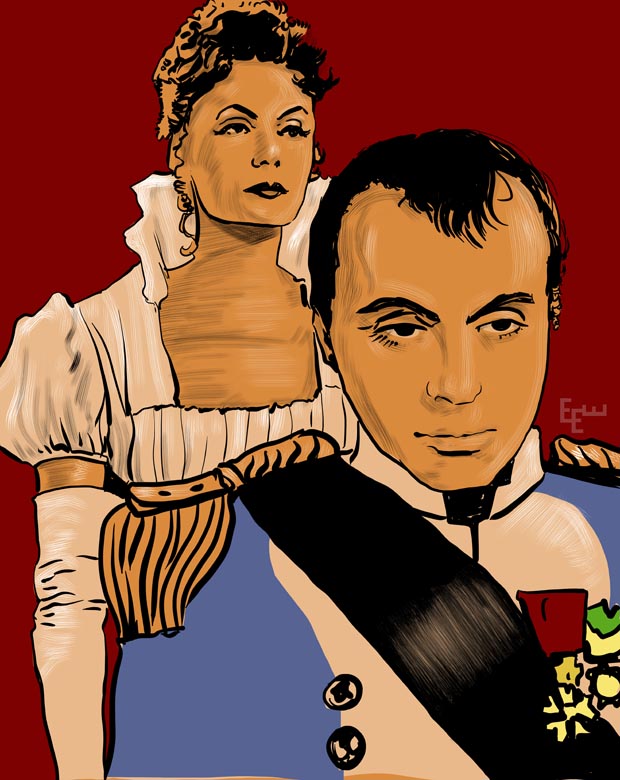Conquest - 1937

Conquest - released Oct 22, 1937. Directed by Clarence Brown and Gustav Machaty. Starring Greta Garbo and Charles Boyer.
Napoleon in love
Greta Garbo plays a beautiful Polish wife who is sacrificed to the conquering leader of the French army (Napoleon Bonaparte, played by Boyer) that sweeps into Poland and kicks out the Cossacks that had just a bit earlier arrived as a ruthless Russian invasion force. But the title Conquest also works as a description of what happens when Napoleon gets emotionally attached to Greta (Countess Marie Walewska) and this connection moves through the years as Napoleon's career as a world-conquering emperor goes through its ups and downs.
Boyer makes for a likeable Napoleon, and his mannerisms and way of speaking seem a perfect model of a parody of Napoleon (Boyer himself was French, and so his accent is quite legitimate. Napoleon was actually Corsican and French was for him a second language.) I wonder if Conquest and Boyer's version of Napoleon seems familiar because of what has come afterward (particularly in terms of comedy). Boyer's version is a lot like how we automatically "see" Napoleon, arms behind his back, walking forward hurriedly, emitting a kind of genius inquisitiveness, though any emphasis on his height is hardly made by director Clarence Brown.
Despite the backdrop of constant wars starting up, there is gentle humor in Conquest, particularly with Maria Ouspenskaya (as Countess Pelagia Walewska) effortlessly trading funny lines with Boyer, building up a comedic scene, bit by bit, involving a card game. Ouspenskaya doubts if Napoleon's claims to world-famous importance are true, and the world conqueror then begins frustratingly losing at cards to the little old lady. This is when Garbo is finally brought back on the screen, but she only gets to share a little in the film's warmer moments, and by the halfway point of Conquest the movie is bogged down by trying to provide biography crowded by famous historical events, and the romantic story is never really able to catch up. (This conflicted story-telling lead to poor box office in the films original release, and added to claims that Garbo's appeal had seriously waned with the public, something not corrected until Ninotchka in 1939.)
The title Conquest acts as a statement for Napoleon's personality as we're shown that he has something of an addiction to the importance of winning battles. He is also determined to create a lasting line of Bonaparte children as the roster of a line of royalty in Europe, despite the snobby objections of the existing royals who look down on his Corsican origins. Using his powers as emperor in France, he forces his way into the royal families of Europe via marriage, certain this will anchor his fame and name into history. This contrast of marriage as strategy versus his long-term love affair with the Countess Walewska might be central to the movie, but the whole tale is hampered by a story that is too episodic and at its worst is a slide show of Napolean's career.
For her efforts, which at one point are encouraged by the leaders of Poland, desperate for Napoleon to keep the Russians out and to back their hope for independence, the Countess is eventually disowned by her husband, who is a much older man (played by Henry Stephenson) who is portrayed in a way that indicates we're not meant to like him much, anyway (this kind of spills over onto the whole movie).
She and Napoleon will meet a few more times in the succeeding years, Boyer repeatedly throwing away his chances for happiness with Garbo (and the child their affair has produced) so that he can continue winning, pursuing or pining for military and political victories. At one point she provides a possible escape for Napoleon to leave the island prison of Elba where the British have him socked away, suggesting he travel with her and their young son to America, but he will wistfully reject it.
The movie has splendid productions values, and is a glossy M-G-M movie that features large movie sets, lots of extras (especially soldiers) and gorgeous period costuming. The story itself can't keep the quasi-biography of Napoleon going while also spinning the tale of a romance spanning years, and in the end both sides of the tale are hurt (for example, the Battle of Waterloo is hardly covered), and the story concentrates its energy on keeping it all straight instead of providing entertaining vignettes of this famous life.
After awhile, Greta isn't given a lot to do but to show up periodically to demonstrate that Napoleon is still striving for greatness, yet still has a yen for her, and the tension that he might still somehow make the better decision (settle down with Garbo) is never established, for in the end, though she is his "conquest" the draw of world importance has conquered him.
Original Page June 2020 | Updated Aug 2020
Joan Crawford Films
Original Page October 2017 | Updated March 2020
What's Recent
- Island of Desire - 1951
- Road to Morocco
- The Devil and Miss Jones - 1941
- Sinners - 2025
- Something for the Boys - 1944
- The Mark of Zorro - 1940
- The Woman They Almost Lynched - 1953
- The Cat Girl - 1957
- El Vampiro - 1957
- Adventures of Hajji Baba – 1954
- Shanghai Express 1932
- Pandora's Box – 1929
- Diary of A Chambermaid - 1946
- The City Without Jews - 1924
- The Long Haul
- Midnight, 1939
- Hercules Against the Moon Men, 1964
- Send Me No Flowers - 1964
- Raymie - 1964.
- The Hangman 1959
- Kiss Me, Deadly - 1955
- Dracula's Daughter - 1936
- Crossing Delancey - 1988
- The Scavengers – 1959
- Mr. Hobbs Takes A Vacation - 1962
- Jackpot – 2024
- Surf Party - 1964
- Cyclotrode X – 1966